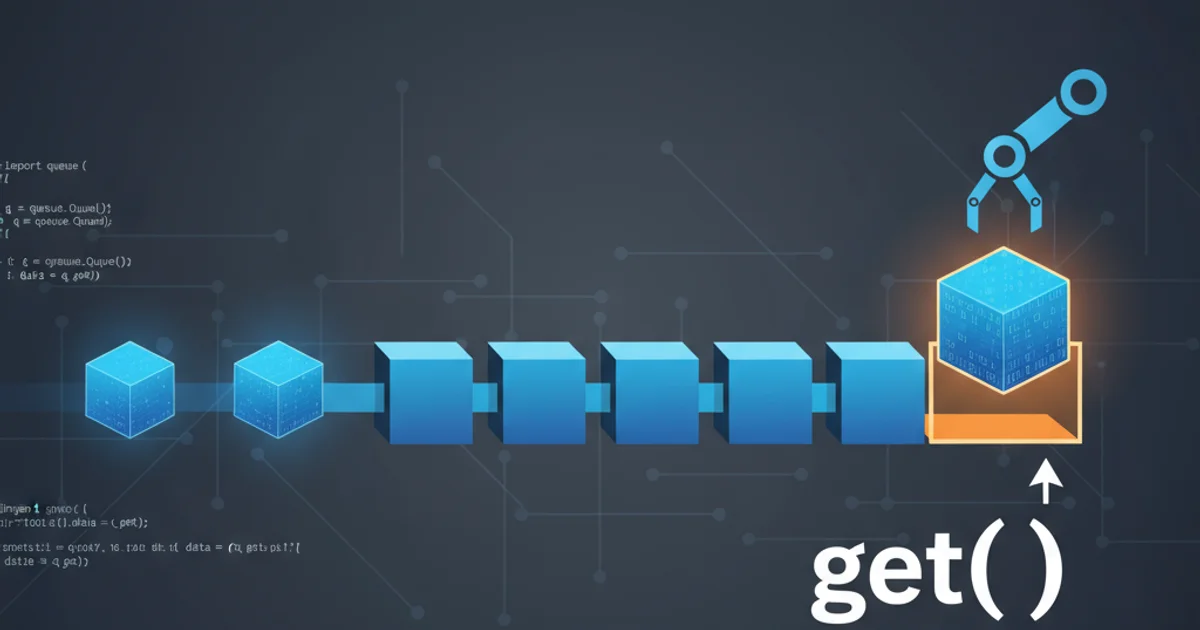Python Queue.Queue.get Method
Categories:
Understanding Python's Queue.Queue.get() Method

Explore the get() method of Python's Queue.Queue for thread-safe data retrieval, including blocking behavior, timeouts, and common use cases.
The Queue module in Python provides a thread-safe way to implement a producer-consumer pattern, allowing multiple threads to safely exchange data. At the heart of consuming data from a queue is the get() method. This article delves into the intricacies of Queue.Queue.get(), explaining its parameters, behavior, and how to use it effectively in concurrent programming.
Basic Usage and Blocking Behavior
The primary function of Queue.Queue.get() is to remove and return an item from the queue. By default, get() is a blocking call. This means if the queue is empty, the calling thread will pause its execution and wait indefinitely until an item becomes available. This blocking behavior is crucial for synchronization in multi-threaded applications, as it prevents consumer threads from busy-waiting and wasting CPU cycles.
import queue
import threading
import time
def producer(q):
for i in range(3):
time.sleep(0.5) # Simulate work
item = f"Item {i}"
q.put(item)
print(f"Produced: {item}")
def consumer(q):
for _ in range(3):
item = q.get() # Blocks if queue is empty
print(f"Consumed: {item}")
q.task_done() # Indicate item processing is complete
q = queue.Queue()
producer_thread = threading.Thread(target=producer, args=(q,))
consumer_thread = threading.Thread(target=consumer, args=(q,))
producer_thread.start()
consumer_thread.start()
producer_thread.join()
consumer_thread.join()
print("All items processed.")
Basic producer-consumer example demonstrating blocking get().
sequenceDiagram
participant Producer
participant Queue
participant Consumer
Producer->>Queue: put(Item 0)
Producer->>Queue: put(Item 1)
Consumer->>Queue: get()
Queue-->>Consumer: Item 0
Consumer->>Queue: get()
Queue-->>Consumer: Item 1
Consumer->>Queue: get()
Note over Consumer,Queue: Queue is empty, Consumer blocks
Producer->>Queue: put(Item 2)
Queue-->>Consumer: Item 2
Consumer->>Queue: get()
Note over Consumer,Queue: Queue is empty, Consumer blocks indefinitely (unless timeout/non-blocking)Sequence diagram illustrating the blocking behavior of Queue.get().
Handling Empty Queues with block and timeout
While blocking indefinitely is often desired, there are scenarios where a consumer thread should not wait forever. The get() method offers two parameters to control this behavior: block and timeout.
block: A boolean argument (defaultTrue). If set toFalse,get()will not block. If the queue is empty, it will immediately raise aqueue.Emptyexception.timeout: A numeric argument (defaultNone). IfblockisTrueandtimeoutis provided,get()will wait for at mosttimeoutseconds. If no item is available within that period, it will raise aqueue.Emptyexception.
import queue
import time
q = queue.Queue()
# Non-blocking get
try:
item = q.get(block=False)
print(f"Got item (non-blocking): {item}")
except queue.Empty:
print("Queue is empty (non-blocking).")
# Blocking get with timeout
q.put("Timed Item")
try:
item = q.get(timeout=1) # Wait for up to 1 second
print(f"Got item (with timeout): {item}")
except queue.Empty:
print("Queue is empty after timeout.")
# Demonstrate timeout when queue is empty
try:
print("Attempting to get from empty queue with timeout...")
item = q.get(timeout=0.5) # Will time out
print(f"Got item (unexpected): {item}")
except queue.Empty:
print("Queue was empty, timeout occurred.")
Examples of get() with block=False and timeout.
get(block=False) or get(timeout=...), always wrap the call in a try...except queue.Empty block to gracefully handle cases where no item is available.The Role of task_done() and join()
After retrieving an item with get(), it's good practice to call Queue.task_done() once the processing of that item is complete. This method signals that a 'put' operation has been matched by a 'get' and subsequent processing. The Queue.join() method blocks until all items in the queue have been processed (i.e., until a task_done() call has been received for every item ever put into the queue). This is essential for ensuring all work is finished before a program exits or a thread terminates.
import queue
import threading
import time
def worker(q):
while True:
try:
item = q.get(timeout=1) # Use timeout to allow graceful exit
print(f"Working on {item}")
time.sleep(0.1) # Simulate work
q.task_done()
except queue.Empty:
print("Worker: Queue empty, checking for more work...")
break # Exit loop if queue is empty for a while
q = queue.Queue()
# Put some items
for i in range(5):
q.put(f"Data-{i}")
# Start a worker thread
worker_thread = threading.Thread(target=worker, args=(q,))
worker_thread.start()
# Wait for all items to be processed
q.join()
print("Main: All tasks done.")
# To stop the worker, you might put a sentinel value or rely on timeout
# For this example, the worker breaks after timeout when queue is empty.
Using task_done() and join() for coordinated shutdown.